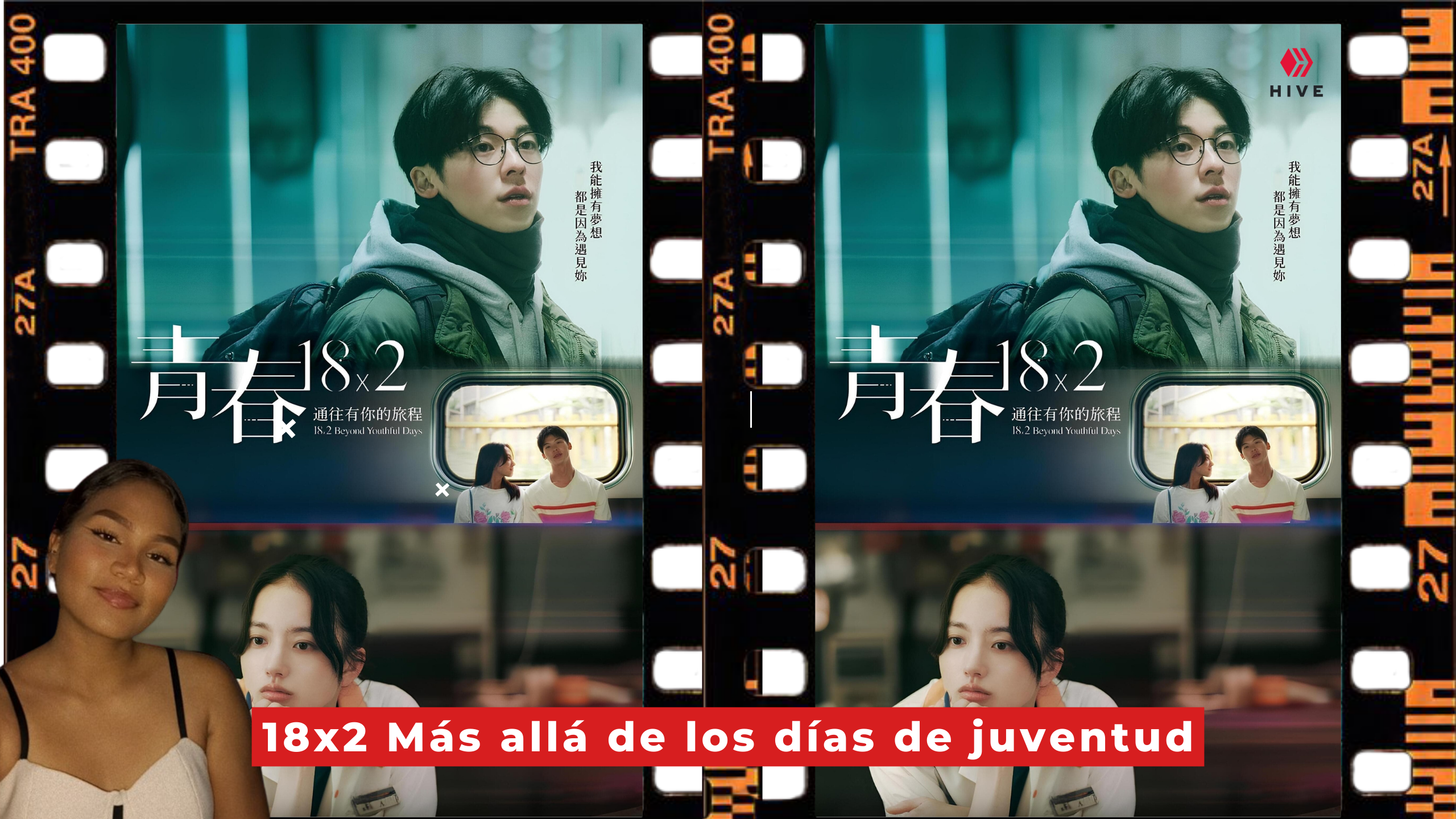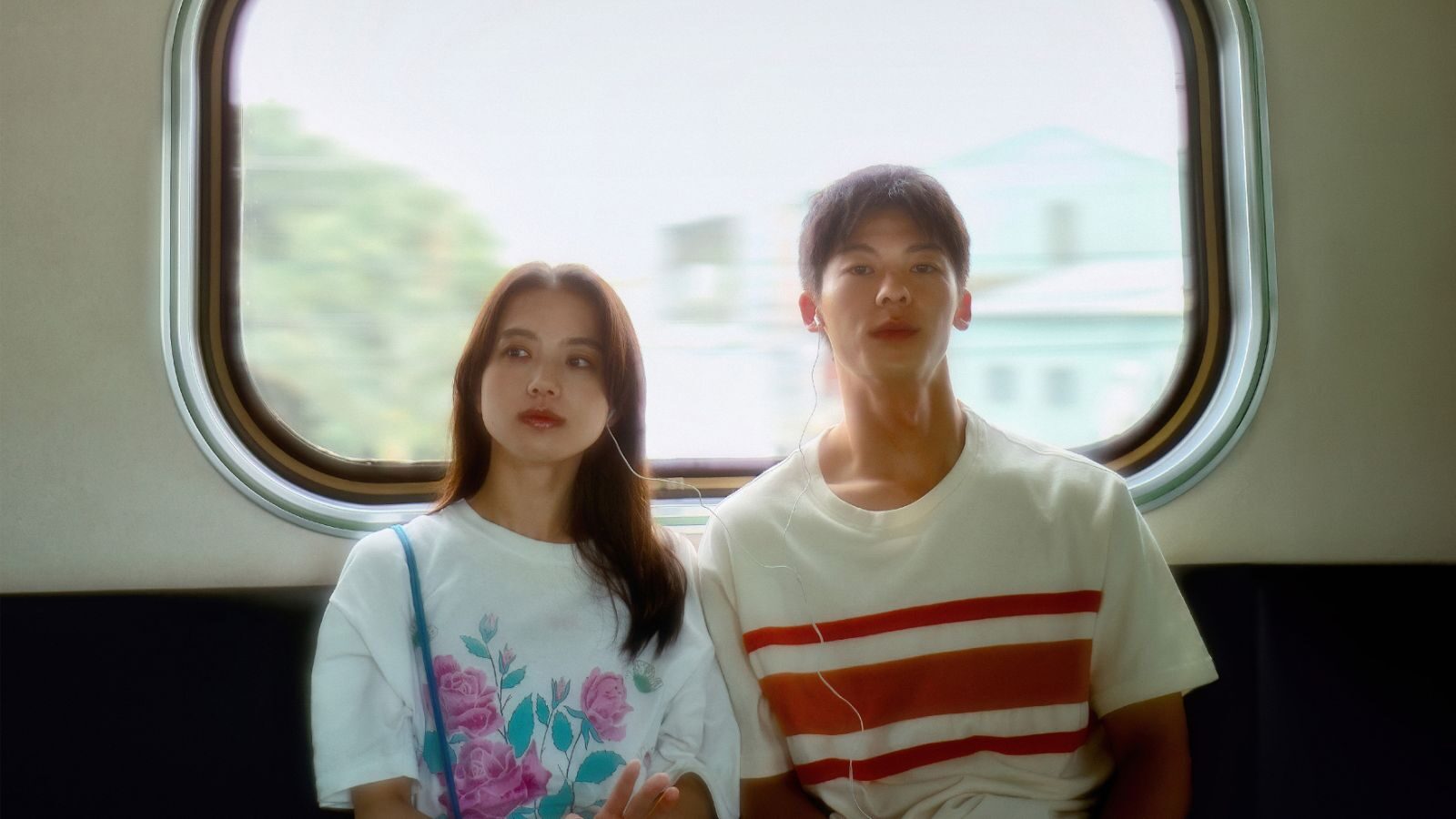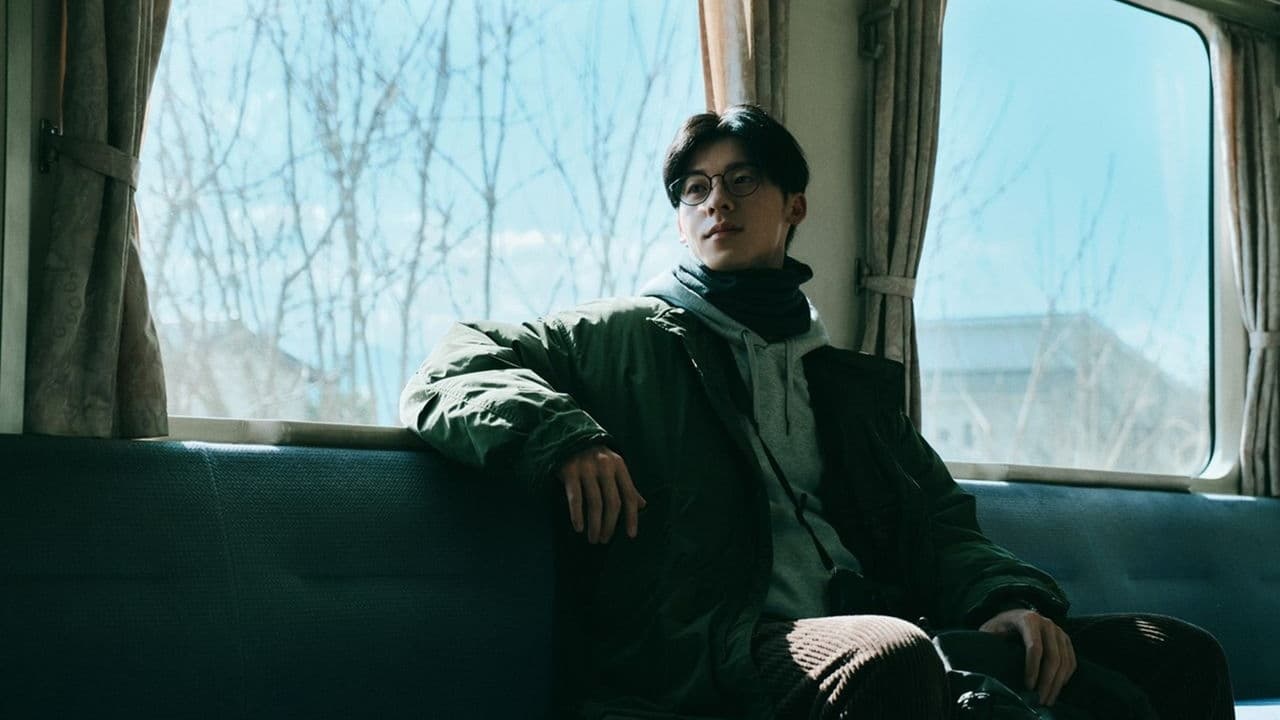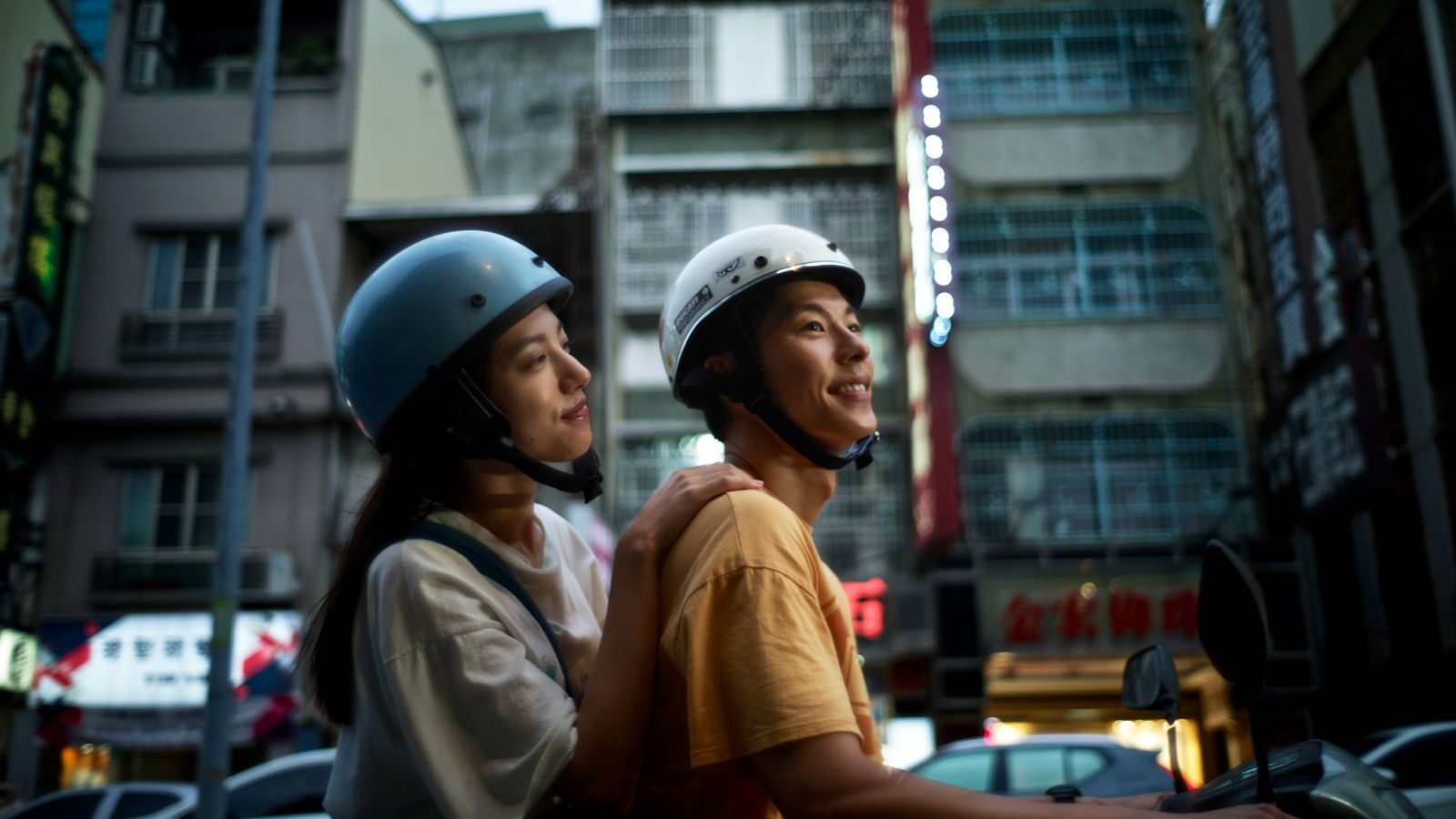❝18×2 Beyond Youthful Days❞ — REVIEW [ING/ESP]
𝐇𝐞𝐲, 𝐇𝐢𝐯𝐞
.png)
Asian cinema has taken snapshots of feelings and emotions, portraying them with a delicacy that touches the soul. The vision of a story can encompass so many of life's own moments that it touches you deeply. Then you see yourself, sitting there, thinking, what are we doing? What is the future if you don't live in the present? Where are you headed? Perhaps to regret, or to discover yourself.
Between the large number of releases, and the repetitiveness of Hollywood, the superficiality of its scripts leaves you empty, but of moods. For the past few months I have opted for Asian cinema, the one that only reaches festivals in its own continent and its releases do not receive promotions in streaming accounts. A cinema that portrays a story to empathize with, where the seventh art is still reflected.
I sifted through the variety of choices while browsing online, this movie chose me, not the other way around. That's when after two hours, I find myself writing about the perfect arrival of this work into my life, and how it's a way to sit back and clear my head as the start of the year comes in a storm of emotions.
AQUÍ EN ESPAÑOLEl cine asiático ha tomado instantáneas de los sentimientos y emociones, las retratan con una delicadeza que llega al alma. La visión de una historia puede abarcar tantos momentos propios de la vida, que cala hondo. Entonces te ves a ti mismo, sentado, pensando ¿qué estamos haciendo? ¿Qué es el futuro si no vives el presente? ¿A dónde te diriges? Quizás al arrepentimiento, o a descubrirte a ti mismo.
Entre la gran cantidad de estrenos, y la repetitividad de Hollywood, la superficialidad de sus guiones te deja vacíos, pero de ánimos. Desde hace unos meses he optado por el cine asiático, el que solo llega a festivales en su mismo continente y sus estrenos no reciben promociones en las cuentas de streaming. Un cine que retrata una historia con la que empatizar, en donde se refleja aún el séptimo arte.
Revisé entre la variedad de opciones mientras navegaba en línea, esta película me escogió, y no al revés. Es entonces cuando luego de dos horas, me encuentro escribiendo sobre la perfecta llegada de esta obra a mi vida, y como es una forma de sentarme a despejar la cabeza en un inicio de año que viene en una tormenta de emociones.

Directed by Michihito Fujii and starring Greg Han Hsu and Kaya Kiyohara, 18x2 Beyond Youth tells the story of Jimmy, a man who has just lost his job and returns to his hometown in search of an answer, something to make him feel alive. It is then that he finds an old postcard wrapped in a memorable scent, which will make him fall into the memories of the past and make the decision to embark on a journey to find himself, and an old backpacker love, named Ami.
This film is an adaptation of a memoir Youth 18×2 Japan Wanderers on Slow Trains that went viral on the internet in 2014. The director chose to tell the story from the perspective of the melancholic Jimmy, portraying the man's emotions such as loneliness, sadness, searching and longing, as well as the phases of falling in love. I believe that the viewer can easily empathize with the emotions of the protagonist, and depending on the age range can experience the feeling of identification.
The story is presented in two timelines, the past: where Jimmy, a young Taiwanese and Ami, a Japanese backpacker girl, meet and begin to establish this relationship that unites them during the summer, a month full of new experiences where they decide to learn more of each other's language to get to know each other and cherish the feelings that are developing. The present: where Jimmy does not know exactly what he has been doing for the last 18 years of his life, intensely pursuing a promise made in his adolescence.
AQUÍ EN ESPAÑOLDirigida por Michihito Fujii y protagonizada por Greg Han Hsu y Kaya Kiyohara, 18x2 Más allá de la juventud cuenta la historia de Jimmy, un hombre que acaba de perder su puesto de trabajo y regrese a su ciudad natal en busca de una respuesta, algo que le haga sentir vivo. Es entonces cuando encuentra una vieja postal envuelta en un aroma memorable, que le hará caer en los recuerdos del pasado y tomar la decisión de emprender un viaje para encontrarse a sí mismo, y un viejo amor mochilero, llamado Ami.
Este film es una adaptación de unas memorias Jóvenes 18×2 Japón Vagabundos en trenes lentos que se hicieron virales en internet en el 2014. El director optó por narrar la historia desde la perspectiva del melancólico Jimmy, retratando las emociones del hombre como la soledad, la tristeza, la búsqueda y el anhelo, además de las fases del enamoramiento. Considero que el espectador puede empatizar con facilidad con las emociones del protagonista, y según los rangos de edad se puede experimentar el sentirse identificado.
La historia está presentada en dos líneas temporales, el pasado: dónde Jimmy, un joven taiwanés y Ami, una chica mochilera japonesa, se conocen y comienzan a entablar esta relación que los une durante el verano, un mes repleto de nuevas experiencias donde deciden aprender más el idioma del otro para conocerse y albergar con aprecio los sentimientos que se van desarrollando. El presente: dónde Jimmy no sabe con exactitud que ha hecho los últimos 18 años de su vida persiguiendo con intensidad una promesa hecha en su adolescencia.

The psychology of the characters is well interpreted, denoting the differences in their behaviors between the age gaps in which they are presented, which allows an understanding of their actions for the viewer. The play has a first-rate performance, highlighting the work of its protagonists who take us by the hand through their misfortunes, confusions, longings and search. Kaya Kiyohara (Ami), although she is not who has more relevance in the story, has such nostalgic scenes that shake the heartbeat and is the one who gives a great plot twist that takes you to tears; while Greg Han Hsu (Jimmy) presents a special charisma that endears easily, and you suffer each of its stages, you climb through their advice and makes you listen carefully to their way.
With a variety of tourist scenes in Taiwan and Japan, the director and the production took good care of their images, using orange and blue tones as the main ones, making a strong impact by evoking feelings of youth and sociability in contrast to the melancholy and coldness. Throughout the film a lot of angles are conveyed, especially close-up shots that make you feel closer to the characters, allowing the smooth movements of the cameras also allowed a natural approach to the story.
AQUÍ EN ESPAÑOLLa psicología de los personajes está bien interpretada, denotando las diferencias de sus comportamientos entre las brechas de las edades en las que son presentados, lo que permite una compresión de sus acciones para el espectador. La obra tiene una interpretación de primera, destacando el trabajo de sus protagonistas que nos llevan de la mano a través de sus desdichas, confusiones, anhelos y búsqueda. Kaya Kiyohara (Ami), aunque no es quién tiene más relevancia en la historia, tiene escenas tan nostálgicas que agitan los latidos del corazón y es quien da un gran giro de trama que te lleva hasta el llanto; mientras que Greg Han Hsu (Jimmy) presenta un carisma especial que encariña con facilidad, y sufres cada una de sus etapas, trepas a través de sus consejos y te hace escuchar atento su camino.
Con variedad de escenarios turísticos en Taiwán y Japón, el director y la producción cuidaron muy bien sus imágenes, utilizando tonos naranjas y azules como los principales, marcando con ímpetu la brecha al evocar sentimientos de juventud y sociabilidad en contraste de la melancolía y frialdad. Durante toda la película se transmiten gran cantidad de ángulos, sobre todo tomas en primer plano que te hace sentir más cercano a los personajes; permitir los movimientos suaves de las cámaras también facilitó un acercamiento natural con la historia.

SPOILER. I'm not going to lie and say that I didn't perceive what had happened to Ami since a little before the middle of the movie, however, the scenes that narrate her own suffering while listening to her last words to Jimmy are like knives in the chest. But what made me cry silently is the plot twist at the closing of the story, when we realize that Jimmy already knew about his demise and that is the reason for his emotional decline that leads him to lose his job, presenting a man who had been repressing his suffering for about 10 years and delaying the confrontation of grief, something that seems all too common among men and that reveals an important message for society: live, feel, cry, overcome and go on.
18x2 Youth, as it was labeled in some festivals, is a film that everyone should see at some point in life. It is perceived as a teenage romance that pushes a man to be more mature in the pursuit of his dreams, but does not leave behind his inner child who represses emotions that can trap him in his bubble. I didn't see this movie as a love story, to me it is the introspective portrayal of a man who loses the meaning of his own life, but faces an emotional storm to regain a course, no matter what the path.
So dear reader, what's next for you in life?
AQUÍ EN ESPAÑOLSPOILER. No voy a mentir y decir que no percibí lo que había acontecido con Ami desde un poco antes de la mitad de la película, sin embargo, las escenas que narran su propio sufrimiento mientras se escuchan sus últimas palabras para Jimmy son como cuchillos en el pecho. Pero lo que me hizo llorar en silencio es el giro de trama en el cierre de la historia, cuando nos percatamos que Jimmy ya sabía sobre su deceso y es esa la razón de su decaída emocional que lo lleva a perder su trabajo, presentando a un hombre que llevaba unos 10 años reprimiendo su sufrimiento y atrasando el enfrentamiento del duelo, cosa que parece demasiado común entre hombres y que revela un mensaje importante para la sociedad: vive, siente, llora, supera y sigue.
18x2 Juventud, como lo catalogaron en algunos festivales, es un film que deberíamos ver todos en algún momento de la vida. Se percibe como un romance adolescente que impulsa a un hombre a ser más maduro en la búsqueda de sus sueños, pero que no deja atrás a su niño interior que reprime emociones que pueden atraparlo en su burbuja. No vi esta película como una historia de amor, para mí es la representación introspectiva de un hombre que pierde el sentido de su propia vida, pero enfrenta una tempestad emocional para recuperar un curso, sin importar cuál sea el camino.
Entonces querido lector, en la vida ¿qué sigue para ti?
Translated with DeepL Free version.

Interesante pelicula para observar, siempre me he preguntado como es el romance asiatico, pues es una cultura muy distinta a la nuestra.
Realmente transmiten con bastante facilidad las emociones, sin embargo, si te das la oportunidad de verla, sugiero inclinarse más a la parte instrospectiva que aunque parte del romance, tiene un mensaje más profundo.
Gracias por el apoyo.
se ve buena, excelente post!
looks good, excellent post!
Muchas gracias por el apoyo, un abrazo.
The film you tell us about in this post is interesting, as is the reflection you got from it. I think it is a good choice to watch with my daughters, given the lesson. Thanks for the recommendation.
Interesante la película que nos cuentas en esta publicación, y la reflexión que obtuviste sobre ella. Creo que es una buena elección para verla junto a mis hijas, dada la enseñanza. Gracias por la recomendación
Si la ve con sus hijas, considero que es un film que podría marcarlas a todas. Ójala poder leer su opinión si sucede, muchas a gracias a usted por el apoyo.
Es verdad que el cine asiático tiene una forma especial de tocar el alma y de retratar emociones con una delicadeza que a veces falta en otras producciones. La pndre en mi lista!